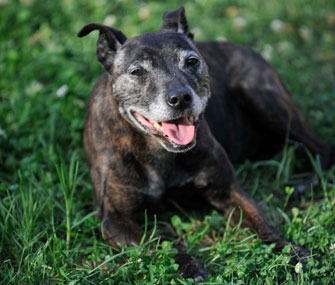What You Need to Know About Adopting a Senior Pet
Published on October 15, 2012
Skip To

Geriatric animals are arguably the least appreciated and most dismissed group of would-be rescue pets. Although they have many positive points, too many people balk at the prospect of potentially bigger vet bills for senior pet health issues and a diminishing lifespan.
That’s a rational take on the subject. But it’s also perfectly rational to say that old pets deserve forever homes, just like the rest of us.
Unfortunately, the truth is that senior pet adoptions are not for everyone. Homes with small children or too-rambunctious fellow housemates are probably not a perfect fit. Nor is an older pet ideal for those who seek an active playmate.
Despite these drawbacks, senior pets offer plenty more pluses than you might think:
They’re Typically Trained
Older pets usually come fully trained, and their been-there-done-that attitude shows. As such, they tend to integrate more seamlessly into new households.They’re More Chill
Like their human counterparts, older pets are inclined to be mellower, require less exercise and are easier to handle, in general. For some households, it’s the lure of the relaxed that makes all the difference — for both the people and other pets in the household.They’re Gracious
Although adopters tend to worry about this, older pets can bond every bit as much as young pets — even more so in some cases because of the additional personal assistance that some of these guys require.It’s no secret that the bond between humans and pets seems to accelerate with age, and it’s my theory that the more they need us, the more we learn how much we really need them.
All of this said, older pet adoptions do have their unique considerations. To make your senior adoption proceed as smoothly as possible, here’s what I recommend that potential owners always keep in mind:
Find the Right Rescue
Almost all shelters and rescue groups have senior pets available for adoption. Some are better at helping you out with their special needs than others, such as rescue groups that are exclusively dedicated to placing older pets. Check out this list of geriatric dog rescues put out by The Senior Dog Project.Brush Up on Senior Pet Issues
Consider researching the situations that you may face and the products that you may need. Here’s a great list of resources offered by the San Francisco geriatric dog rescue group Muttville. And read this article on “senior kittizens" put out by the folks at Cornell University’s Feline Health Center.Geriatric-Proof Your Home
After taking into consideration a pet’s health concerns — everything from vision and hearing loss to exercise intolerance and orthopedic problems — an older adoptee’s new home should be prepared for his arrival.Access to certain high-risk areas, like pools and stairs, may need to be restricted. And slippery surfaces must be minimized for some older pets. For geriatric cats, in particular, easy access to multiple litterboxes is also highly recommended.
Consider Pet Insurance or a Pet Health Care Savings Plan
Geriatric pets may come with preexisting health issues. And even when they don’t, it’s likely that some are just beyond the horizon. Since it’s hard to know how long your older pet will live, it’s a great idea to get started on a financial plan in advance. I strongly recommend that owners either purchase a pet health insurance policy for senior pets or start saving a set amount of money each month for future expenses.Enlist Your Veterinarian’s Help
Be sure to ask for a comprehensive physical examination and basic laboratory testing. And don’t be shy about discussing how often your older pet should be seen, what nutritional considerations she recommends, and which preventive or basic maintenance measures you should be taking.Here’s hoping that I’ve enticed at least a few of you to consider taking in some oldies, who remind us that every single day we spend with our pets is absolutely precious.
Check out more opinion pieces on Vetstreet.





